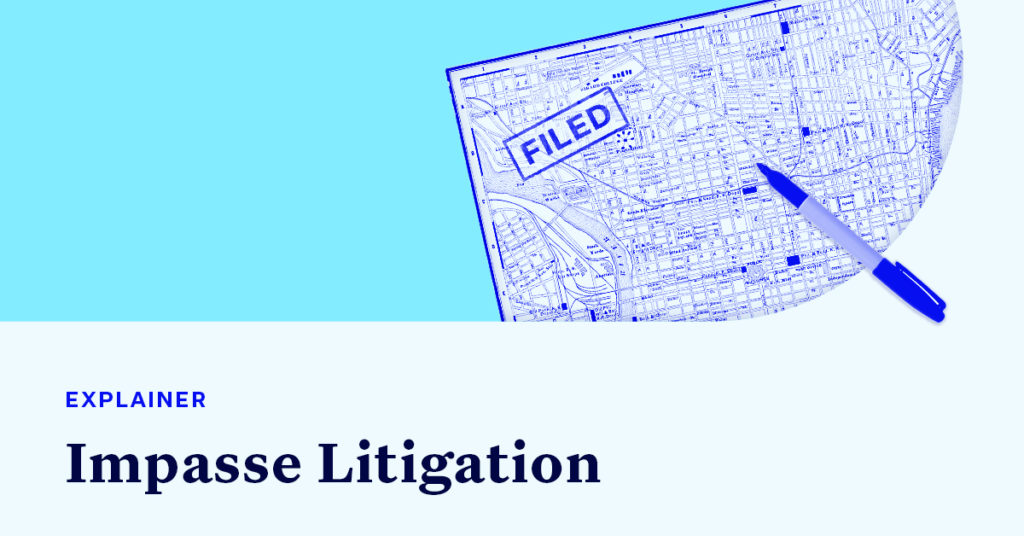Impasse Litigation: When Politicians Can’t Agree on New Maps

With once-a-decade redistricting now in full swing across the country, litigation over it is also starting to heat up. As one might expect, lawsuits have already been filed challenging some of the maps newly enacted by states. However, in other states legal challenges have been brought before new maps have even been drawn. One such state is Wisconsin, with suits already under way in both a federal court and the state Supreme Court. You might be wondering: How can a state be sued over maps that don’t exist yet?
What’s going on in Wisconsin is a special type of redistricting litigation called impasse litigation. In today’s Explainer, we walk through what it is, where else we might see it this redistricting cycle and what the courts can do in these cases.
What is impasse litigation?
While the term “impasse litigation” sounds complicated, it’s actually quite simple. When control of redistricting is divided, politicians sometimes fail to reach an agreement on a new redistricting plan. Impasse litigation allows voters to sue to ensure new districts are enacted before the next election. In essence, if the politicians controlling redistricting in a state are deadlocked (or likely to become deadlocked), voters can sue to overcome this impasse.
Timely redistricting is of critical importance, as state populations can change wildly in 10 years — both in raw numbers and in how population is distributed within a state. When one part of a state becomes more populated, it needs a greater share of state legislative and congressional seats to ensure its residents’ votes count as much as those in less populated parts. Failing to redraw districts in this scenario would violate the constitutional rights of voters living in more populated areas by diluting their voting power. Impasse litigation thereby allows voters to sidestep partisan gridlock and protect their constitutional rights by ensuring new districts are drawn before the next election.
Where can we expect to see impasse litigation this cycle?
Impasse litigation is most common in states that have both divided governments in control of redistricting and a history of partisan impasses leading to a failure by the political branches to enact new maps. Over the past four decades in Wisconsin, for example, every time political branches of government were split along partisan lines, federal court intervention was necessary to implement new districts. Similarly, in Minnesota, the courts have had to redraw the state’s districts every redistricting cycle since 1980. Both of these states face the redistricting process with divided governments once again, making them particularly suitable for impasse litigation. Like Wisconsin, Minnesota has already had at least one impasse litigation suit filed this year.
Challenges have also been filed in Pennsylvania and Louisiana, two other states with divided governments this year and a strong likelihood of failure on the part of the political branches to enact new maps in time for the 2022 elections. While litigation is possible in other states with divided governments, we currently do not expect any additional challenges to be filed, but we’ll be keeping our eyes out.
What can the courts do?
Impasse litigation allows the courts to step in and take control of mapmaking. They can block the state from using outdated maps in the next election and appoint special redistricting panels if politicians are unable to draw new maps in time. This relief ensures the new census data is used to redraw district lines and that voters have equitable voting power in advance of the 2022 elections.
The pandemic-associated delay of census data has shortened the amount of time states have to reach an agreement on new districts, giving impasse litigation an even more critical role in redistricting this year. We’ll be keeping close track of all the current impasse litigation, along with other redistricting lawsuits, on our Cases page.